|
|
|
Sort Order |
|
|
|
Items / Page
|
|
|
|
|
|
|
| Srl | Item |
| 1 |
ID:
158674
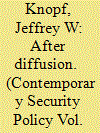

|
|
|
|
|
| Summary/Abstract |
This article discusses six challenges to enforcing norms regarding nuclear weapons. Three challenges reflect generic problems in international politics. These are differences in power, the collective action problem, and trade-offs with other interests. Three additional dilemmas reflect specific characteristics of the nuclear realm. First, membership in international treaties connected to the norms is not universal, raising questions about the appropriateness of enforcement against states that have not signed the treaties. Second, different implications of the norms can come into conflict with each other. In particular, there can be tensions between the requirements of nonproliferation and disarmament norms. Finally, some common options for norm enforcement become quite problematic when dealing with nuclear weapons. For example, if states respond to defections by starting their own nuclear weapons programs, this tit-for-tat response would defeat the purposes of the nonproliferation regime. Despite these challenges, nuclear norms enjoy widespread support and some enforcement is possible.
|
|
|
|
|
|
|
|
|
|
|
|
|
|
|
|
| 2 |
ID:
158679


|
|
|
|
|
| Summary/Abstract |
The literature on the India–Pakistan nuclear conundrum has neglected the impact of the international normative environment on India and Pakistan’s nuclear behavior. This article fills that gap, by looking at the impact of the nuclear taboo on Indo-Pakistani strategic interactions during the 1999 Kargil war and the 2002 border standoff. The nuclear taboo, rather than nuclear deterrence, explains the non-use of nuclear weapons. During both crises the nuclear taboo entered the decision-making process instrumentally, in the form of perceived reputational “costs.” The Indian and Pakistani emerging nuclear doctrines endanger a fragile nuclear taboo that would be strengthened by a bilateral non-first use accord. Whether India and Pakistan can move from an instrumental to a substantive acceptance of the nuclear taboo will depend on whether the United States and the other nuclear weapon states, included in the Nonproliferation Treaty, play the role of norm entrepreneurs and strengthen the nuclear taboo at the global level.
|
|
|
|
|
|
|
|
|
|
|
|
|
|
|
|
| 3 |
ID:
158677
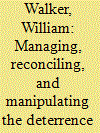

|
|
|
|
|
| Summary/Abstract |
Norm contestation and the search for legitimate and acceptable compromise have been persistent features of the nuclear non-proliferation regime. They have also marked the domestic politics of nuclear weapons, especially within democracies. How do those internal and external contestations and searches for compromise interact? Attention will focus on the United Kingdom that stands out for the openness of domestic debate on nuclear policy, division within political parties, and the role granted to parliament. The United Kingdom has held to an idea of order and responsible stewardship entailing the managed coexistence of nuclear deterrence, arms control, and non-proliferation. Active pursuit of multilateral nuclear disarmament to this end has also helped governments to constrain domestic opposition to the nuclear force's (Trident's) renewal and modernization. The United Kingdom's alignment of domestic and international stances on nuclear weapons is today being jeopardized by its internal turmoil and by international discord over nuclear norms and rules.
|
|
|
|
|
|
|
|
|
|
|
|
|
|
|
|
| 4 |
ID:
158681


|
|
|
|
|
| Summary/Abstract |
The nuclear age has come to be seen as “normal,” marked by a process of “nuclearism” whereby nuclear weapons and deterrence are seen as inevitable and acceptable elements of international security. Factors which have allowed this to flourish include the relative absence of humanitarian considerations, nuclear decision-making by a select few, and the unequal nature of the Non-Proliferation Treaty (NPT), where the P5 states have shaped the nuclear order on their own terms. The “humanitarian initiative” and Treaty on the Prohibition of Nuclear Weapons challenge this “normal” nature of nuclear weapons, re-casting them as incompatible with humanitarian law, and delegitimizing them for all states. This shift away from the structural constraints of the NPT allows non-nuclear states a degree of agency they did not previously possess. Nonetheless, the Treaty faces difficulty in dislodging the practices of the nuclear-weapon states, suggesting that its value lies in its long-term normative influence.
|
|
|
|
|
|
|
|
|
|
|
|
|
|
|
|
| 5 |
ID:
158673
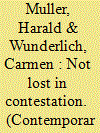

|
|
|
|
|
| Summary/Abstract |
With near universal membership, the nuclear nonproliferation regime can be considered a success of global nuclear governance. While it has proven robust since the Nonproliferation Treaty entered into force in 1970, the regime has faced continuous contestation, precisely because it is a delicate compromise between the nuclear and non-nuclear weapon states. In this article, we analyze the patterns of contestation within the regime as well as the actors driving these contestation processes. Our purpose is to assess how contestation has affected the development of nuclear norms. We show that contestation can lead to normative progress, result in blockage, or even lead to decay. We argue that the outcome depends on three factors: commitment by the powerful parties to appreciate the positions of the non-nuclear weapon states, the engagement of bridge-builders to shape compromises, and the construction of reciprocal gains for and compliance by all parties.
|
|
|
|
|
|
|
|
|
|
|
|
|
|
|
|
| 6 |
ID:
158675
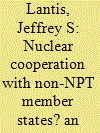

|
|
|
|
|
| Summary/Abstract |
Supporters of the nuclear nonproliferation regime argue that international agreements, power politics, and emerging standards of legitimacy have generated a robust nuclear nonproliferation norm. This optimism is mirrored in early social constructivist international relations theory, which emphasizes the constitutive and regulatory power of international norms. Conversely, this article explores how recent developments in global politics and international relations theory may show how vested players can change normative architectures. This project develops a model of elite entrepreneurship in norm change that includes stages of redefinition and substitution through contestation. It conducts a plausibility probe of the model in the development of the 2008 U.S.–India Civil Nuclear Cooperation Agreement, a case of U.S.-driven norm change. The article concludes that this alternative agency-based model lends insights on what may be a continuous, and consequential, evolution of the nuclear nonproliferation norm.
|
|
|
|
|
|
|
|
|
|
|
|
|
|
|
|
| 7 |
ID:
158671
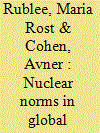

|
|
|
|
|
| Summary/Abstract |
We argue that the framework of norms has generated a progressive research agenda in the field of global nuclear politics, providing important insights that traditional realist and materialist analyses ignore or dismiss. These insights are not on the margins of nuclear politics; rather, they answer central questions about nuclear non-use, possession, and the nonproliferation regime at large. These findings are not a fluke; instead, they stem from the powerful analytical framework of norms, which provides complexes of linked propositions about actor expectations and behavior in global nuclear politics. This article examines three of those propositions: the importance of the logic of appropriateness, the role of norm contestation, and the changes brought about by norm entrepreneurs. Finally, we identify other norms-related ideas that can further illuminate the dire policy crises facing global nuclear governance, as well as specific areas of nuclear politics that would benefit from norms-related scrutiny.
|
|
|
|
|
|
|
|
|
|
|
|
|
|
|
|
|
|
|
|
|